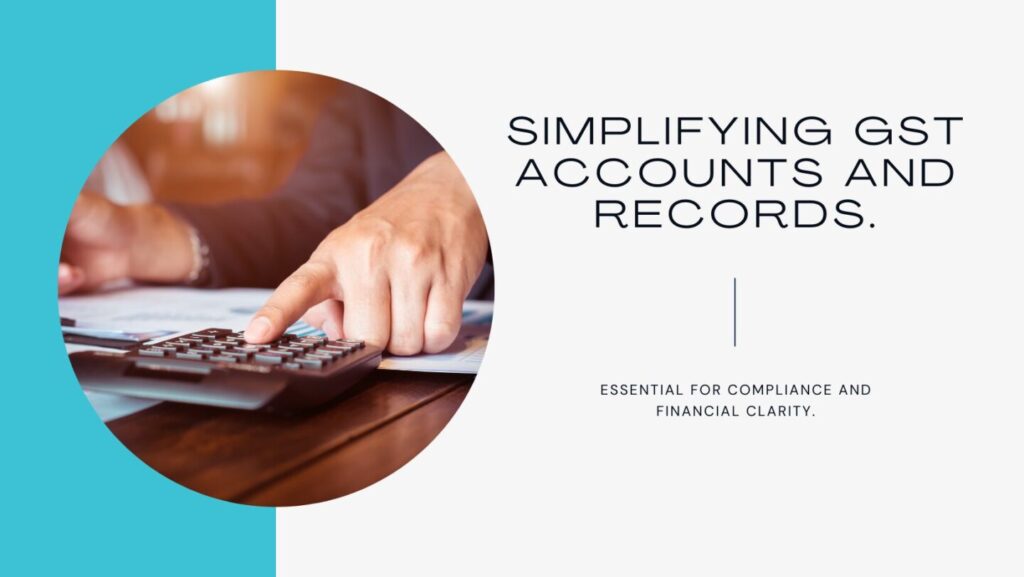Key Takeaways
- Books of Accounts: Include sales and purchase ledgers, inventory records, tax invoices, and payment vouchers, crucial for tax assessment and compliance.
- Records under GST: Encompass documentation evidencing transactions, tax payments, input tax credit, and other GST-related activities.
- Maintenance Requirements: Detailed documentation of transactions, invoices, receipts, and ledgers must be kept, typically for six years.
- Electronic Records: Allowed and encouraged for ease of maintenance and accessibility, provided they are authenticated by a digital signature.
- Penalties: Non-maintenance can lead to significant fines and legal consequences, emphasizing the need for diligent record-keeping.
The Goods and Services Tax (GST) has completely changed how taxes are managed in the corporate world. Any business must comprehend and abide by the GST regulations on the maintenance of books of accounts and records under GST.
The goal of this book is to demystify the procedure and provide company owners a clear route to compliance and peace of mind.
What does “books of accounts” mean in terms of GST?
Books of accounts under the Goods and Services Tax (GST) framework refer to the systematic record of all financial transactions made by a business or an individual registered under GST. These data are essential for calculating the tax payable, claiming input tax credit, and complying with the GST laws and regulations.
The books of accounts include, but are not limited to, sales ledgers, purchase ledgers, inventory data, tax invoices, credit and debit notes, receipt vouchers, payment vouchers, and other relevant documents that provide a detailed account of the business’s financial transactions.
Under GST, maintaining accurate and up-to-date books of accounts is mandatory for every registered taxpayer. These data serve as a vital tool for the government to assess tax liabilities and for businesses to ensure they are paying the correct amount of taxes.

They also play a crucial role during audits, investigations, or assessments conducted by tax authorities. The requirement to maintain these data is aimed at fostering transparency, ensuring compliance, and preventing tax evasion.
What does the term “records” mean in the GST?
Under the Goods and Services Tax (GST) framework, “records” refer to all the documentation and files that a registered taxpayer is required to maintain and keep updated as per the GST laws.
These data attest to a wide range of information, including business transactions, tax payments, credit amounts, and other activities connected to the supply of goods and services subject to Goods and Services Tax.
Records under GST typically include:
- Sales and purchase invoices, along with the tax invoices issued and received.
- Documentation of supply, including exports, imports, and stock transfers between different states or units of the same entity.
- Records of goods and services that have been supplied or received, including returns, advances received or paid, and goods received in consignment.
- Inventory records detail the quantity and value of goods at any given time, including goods in transit.
- Input tax credit availed and utilized, along with the output tax payable and paid.
- Electronic Cash Ledger, Electronic Credit Ledger, and Electronic Liability Register, which track the taxpayer’s GST payments, credits, and liabilities, respectively.
- Additional data, including delivery challans, bills of supply, credit and debit notes, receipts, and payment vouchers,.
These data are necessary to verify the accuracy of the transactions reported in the taxpayer’s tax returns and to support input tax credit claims. Keeping complete and accurate information is not only mandated by law, but it is also necessary for the transparency, compliance, and smooth functioning of the GST system.
Why is it important to maintain books of accounts and records under GST?
Strategic financial planning and analysis need timely and accurate recordkeeping, which is also required by law. Together with preventing financial irregularities and legal repercussions, it helps to guarantee tax compliance, facilitate audits, and optimize tax liabilities.
Here are the key reasons why it’s important:
- Legal Compliance: It’s a legal requirement under the GST law for every registered taxpayer to maintain accurate books of accounts and records. This compliance is essential to avoid legal penalties, fines, or even suspension of business operations due to non-compliance.
- Tax Calculation and Payment: Properly maintained documents are vital for calculating the correct amount of GST owed to the government. They help in determining the tax liability accurately, ensuring that businesses only pay the tax they owe and claim the correct amount of input tax credit (ITC).
- Audit and Scrutiny: The GST regime has provisions for regular audits and scrutiny by tax authorities. Well-organized books of accounts and records make the audit process smooth and efficient, reducing the chances of discrepancies and potential legal issues.
- Input Tax Credit (ITC) Claims: To claim ITC, a business must have evidence of the taxes it has paid on its purchases. Maintaining detailed data supports these claims, ensuring that businesses can effectively reduce their tax liabilities by claiming the credit they are entitled to.
- Dispute Resolution and Legal Evidence: In case of any disputes or litigation, books of accounts and records serve as vital evidence. They provide a factual basis for resolving disputes regarding tax payments, refunds, or credits.
- Financial Management and Analysis: Beyond compliance, maintaining detailed books of accounts and records is essential for sound financial management. They offer insights into the financial health of the business and help in budgeting, forecasting, and strategic planning.
- Transparency and Accountability: Accurate and comprehensive documentation contributes to the transparency of business transactions and enhances accountability to stakeholders, including investors, creditors, and tax authorities.
- Efficiency in Business Operations: Good record-keeping practices can lead to efficiencies in business operations, helping in faster decision-making, better inventory management, and efficient cash flow management.
- Building Trust with Tax Authorities: Regularly maintaining and updating books of accounts and records can build trust with tax authorities, potentially reducing the frequency of audits and inspections.
What records must be maintained under GST?
The GST law mandates the maintenance of various records, including, but not limited to, sales and purchase invoices, stock inventories, input tax credit availed, output tax payable and paid, and others, ensuring transparency and compliance with the tax regime.
| Type of Record | Description |
|---|---|
| Invoices | Detailed data of all sales and purchase invoices, including tax invoices, bills of supply, credit and debit notes, and revised invoices. |
| Receipts | Data of receipts for goods and services bought and sold, including advances and refunds. |
| Supply Documents | Documentation related to the supply of goods and services, such as delivery challans, shipping bills, and e-way bills. |
| Input Tax Credit (ITC) | Detailed data of the input tax credit availed on purchases, including eligibility and claims. |
| Output Tax | Records of GST collected on sales indicate tax payable on outward supplies. |
| Stock Records | Inventory data, including stock-in-hand, goods lost, stolen, disposed of, or given as gifts or samples. |
| Electronic Ledgers | Maintenance of electronic cash ledger, credit ledger, and liability register on the GST portal. |
| Bank Statements | Bank statements and payment data related to business transactions. |
| Other Statutory Documents | Data like the GST registration certificate, tax payment receipts, GST returns filed, and correspondence with the GST department. |
| Financial Statements | Comprehensive financial statements, including balance sheet, profit and loss account, and cash flow statement. |
| Contracts and Agreements | Copies of contracts and agreements with suppliers, customers, and service providers. |
| Account Books | Ledgers, journals, and other account books record financial transactions. |
| Audit Documents | Documents pertaining to GST audits, including audit reports, findings, and rectifications. |
How do I maintain books of accounts and records under GST?
Maintaining Books of Accounts and Records under the Goods and Services Tax (GST) requires systematic efforts to ensure compliance and facilitate accurate tax reporting. Here are some steps and best practices to effectively maintain these data:

Step 1: Understand Legal Requirements
Familiarize yourself with the GST law to understand the specific documents and accounts that need to be maintained. This includes invoices, receipts, ledgers, and electronic records.
Step 2: Use GST-Compliant Software
Implement accounting software that is GST-compliant. Such software can help in automatically generating invoices, maintaining data of sales and purchases, and calculating GST liability accurately.
Step 3: Regularly Update Records
Consistently record all transactions without delay. Regular updates ensure that your books reflect your current financial position and facilitate the smooth filing of GST returns.
Step 4: Maintain Separate Records for Each Registration
If you operate in multiple states or have multiple business verticals, maintain separate books for each GSTIN to comply with state-wise GST regulations.
Step 5: Document Invoices Correctly
Ensure that all invoices are issued as per GST regulations, including details like GSTIN, HSN/SAC codes, tax rates, and invoice value. Keep track of all sales, purchase invoices, and debit/credit notes.
Step 6: Track Input Tax Credit
Maintain detailed data on the input credit (ITC) availed on your purchases and expenses. This is crucial for optimizing your tax liability and ensuring that you claim only the eligible credits.
Step 7: Reconcile GST Returns with Books
Regularly reconcile GST returns filed with the books of accounts to identify discrepancies early and rectify them. This reconciliation should include matching input tax credit claimed with the credits available as per your suppliers’ returns.
Step 8: Secure Storage and Easy Retrieval
Ensure secure storage of books and records, both physical and digital. Use cloud storage for electronic records to safeguard against data loss and ensure easy retrieval when needed for audits or inspections.
Step 9: Understand Record Retention Requirements
Maintain books and documents for at least six years following the end of the financial year to which they pertain, or longer if necessary due to specific provisions or ongoing investigations.
Step 10: Seek Professional Help
Consider consulting with GST experts or accountants, especially if your business transactions are complex. Professional advice can help in maintaining proper data and staying compliant with GST laws.
Step 11: Audit and Review
Periodically audit your accounts, either internally or through an external auditor. This helps in identifying any inadvertent errors or inconsistencies and ensuring compliance with GST laws.
Step 12: Stay Updated on GST Regulations
GST laws and regulations can evolve. Stay informed about any changes in the tax laws to ensure your accounting practices and data remain compliant.
Provisions governing the maintenance of books of accounts under GST

The Goods and Services Tax (GST) legislation in India specifies several provisions governing the maintenance of books of accounts for taxpayers. These provisions are designed to ensure transparency, compliance, and ease of administration of the tax system.
Here are the key provisions related to the maintenance of books of accounts under GST:
- Mandatory Maintenance of Records
All registered taxpayers are required to maintain accurate books of accounts and records at their principal place of business. This includes details of all sales, purchases, stock, input tax credit availed, output tax payable and paid, and other relevant documents.
- Specific Records Requirement
Taxpayers are required to maintain specific data like production or manufacturing data, stock of goods, inward and outward supply of goods or services, input tax credit availed, output tax payable and paid, and other particulars as prescribed.
- Electronic Maintenance of Records
Under the condition that the taxpayer’s digital signature serves as authentication, the GST law permits the maintenance of electronic records. This facilitates easier record-keeping and compliance.
- Retention Period
Every registered person is required to retain books of accounts and other information for at least six years from the due date of filing of the annual return for the relevant year. This period is extended in cases where there is an ongoing investigation or audit.
- Location of Books of Accounts
Books of accounts and records must be kept at the principal place of business and at every related place(s) of business mentioned in the taxpayer’s GST registration certificate.
- Access to Tax Authorities
The data must be made available for inspection and verification by tax authorities upon request. Failure to provide access to these data can result in penalties.
- Record-keeping for Input Tax Credit (ITC)
Detailed records must be maintained to support claims of input tax credit, including invoices received, goods or services received, and evidence of payment for these inputs.
- Backup and Archive
Taxpayers are advised to keep backups of electronic records to safeguard against accidental loss of data.
- Audit Trail
Businesses are expected to maintain an audit trail of amendments or corrections made to the accounts or records, along with the original entries, to ensure transparency and accountability.
- Language and Currency
The data can be maintained in electronic form in any language, provided it is commonly used in the business’s region, but should be translated to English or Hindi if requested by an officer. Additionally, the transaction values must be recorded in the Indian Rupee (INR).
Special Provisions for Certain Categories of Taxpayers
Specific provisions exist for taxpayers involved in certain types of businesses, such as agents, operators of warehouse or godowns, or transporters, who must maintain data relevant to their activities as prescribed by GST regulations.
Penalties for non-maintenance of Books of Accounts and Records under GST
Under the Goods and Services Tax (GST) regime, the non-maintenance or improper maintenance of books of accounts and records can lead to significant penalties and legal consequences for taxpayers.
The GST legislation has laid down specific penalties for various offenses, including those related to the maintenance of data. Here are the key penalties associated with the non-maintenance of books of accounts and records under GST:

General Penalty
- For any offense under GST for which a specific penalty is not prescribed, a general penalty can be imposed. This includes cases of non-maintenance or improper maintenance of books of accounts and records. The penalty can be up to Rs. 25,000.
Penalty for Obstructing the Officer
- If a taxpayer hinders or obstructs any officer in the discharge of his duties, such as during the inspection of books and records, the taxpayer can be penalized with a fine which may extend to Rs. 25,000.
Penalty for Failure to Furnish Information
- If a taxpayer fails to furnish information or documents called for by an officer or fails to produce books of accounts and records for inspection, a penalty of up to Rs. 25,000 can be imposed.
Penalty for False Information
- Supplying false information or falsifying data can attract a heavier penalty. If the taxpayer intentionally submits false information or falsifies records to evade tax, the penalty can be more severe, including fines and even imprisonment, depending on the extent of the offense.
Specific Penalties Related to Audit and Inspections
- If mistakes are found in a taxpayer’s books of accounts because they were not kept up to date or were not kept up properly during an audit, inspection, or scrutiny by GST authorities, the taxpayer may be fined under certain sections that deal with audit and inspection findings.
- This could include a penalty equivalent to the tax evaded or ITC wrongly availed or refunded, among other penalties.
Penalty for Not Keeping Records in Prescribed Manner
- If the taxpayer fails to maintain data in the prescribed manner and format, or if the accounts are not kept at the registered place of business, the authorities may impose a penalty.
It’s important to note that penalties under GST are not just financial; severe cases of non-compliance can lead to business disruptions, revocation of GST registration, and legal action.
The imposition of penalties is also subject to the discretion of the tax authorities, who may consider the taxpayer’s history, the severity of the non-compliance, and any mitigating factors before determining the penalty.
Maintaining accurate and complete books of accounts and records is crucial for GST compliance, and taxpayers should take proactive steps to ensure adherence to the legal requirements to avoid these penalties.
Detailed Rules for Maintenance
Under the Goods and Services Tax (GST) framework, there are specific rules and guidelines regarding the maintenance of accounts and records, which include provisions for recording wrong entries, maintaining records at places other than those mentioned in the registration certificate, electronic maintenance of records, and producing these records upon legal demand.
Here’s an overview of these rules:
Rules With Regards To Maintaining Accounts and Records
- Taxpayers must maintain all invoices, bills of supply, credit and debit notes, and receipt vouchers, among other documents, in a systematic manner.
- Records should include detailed information on sales, purchases, inventories, input tax credit availed, and output tax payable and paid.
- These records must be maintained for at least six years from the last date of filing of the Annual Return for the relevant tax period.
Ways To Record Wrong Entries
- If a wrong entry is recorded in the accounts, it should not be erased, overwritten, or otherwise made illegible. Instead, the incorrect entry should be struck out once and corrected. The signature of the person making the correction should serve as authentication.
- For electronic records, a log of every entry edited or deleted must be maintained, including the original entry, who made the correction, and the date of correction.
Records Maintained at a Place Other Than That Mentioned in the Registration Certificate
- Taxpayers are allowed to maintain records at a place other than the principal place of business mentioned in their GST registration certificate, provided they declare the additional place(s) of business in their GST registration details.
- If the records are kept at a place not declared as a place of business, the taxpayer must inform the jurisdictional tax officer of this location in writing.
Records Can Be Maintained in Electronic Format
- The GST laws permit the maintenance of accounts and records in electronic format. However, a digital signature is necessary to authenticate these electronic records.
- Taxpayers should ensure that the electronic records are accessible in a readable format and are stored securely to prevent unauthorized access or alterations.
- Backup of the electronic records should be maintained in a physically secure location, and a log of every access, edit, or deletion of the data should be kept.
Producing Books of Accounts When Demanded By Law
- When a GST officer requests it, taxpayers must produce their books of accounts and records for inspection. This can be during audits, investigations, or any other scrutiny by tax authorities.
- Failure to produce the requested documents can result in penalties and may be considered an offense under GST laws.
Conclusion
Maintaining books of accounts and complete records under GST is not merely a statutory requirement; it is a fundamental aspect of running a successful business. By adhering to the guidelines and understanding the significance of these data, businesses can ensure compliance, minimize tax liabilities, and maintain a healthy financial status.
Whether registered or not, they must maintain records as prescribed under draft GST rules: Every unregistered person must submit business details electronically in Form GST ENR-01 Every transporter must maintain separate documents for all branches of goods transported, delivered, and stored in transit.
Every warehouse and godown owner/operator must maintain books of accounts for each period that goods remain in the warehouse, including details relating to dispatch, movement, receipt, and disposal of such goods.
At Pice, we offer comprehensive Business payment and gst payment solutions, such as payroll solution for salary management, accounting solutions for vendor payments, and more.
💡If you want to maintain your accounts and records under GST then download and make most of the PICE business payment solution, take a demo session now to see how it works for you.
FAQs
How long should records be maintained under GST?
Under GST, businesses are required to maintain records for at least six years from the last date of filing the annual return. This period corresponds to 72 months from the end of the financial year to which such records pertain. This requirement is crucial for audit purposes, resolving disputes, ensuring compliance with the GST laws, and facilitating a smooth verification process by tax authorities when needed.
Can records and books of accounts be maintained in electronic format under GST?
Yes, under GST, records and books of accounts can be maintained in electronic format, provided they are accessible from India, retained in a retrievable form, and authenticated by the means of a digital signature, if required by law. This flexibility supports the ease of doing business, ensuring that businesses can store, manage, and retrieve financial documents efficiently while complying with GST regulations. It also facilitates easier audits and inspections by tax authorities.
What should be done if a wrong entry is made in the books of accounts under GST?
If a wrong entry is made in the books of accounts under GST, it should be corrected through a rectification entry in the records as soon as the error is discovered. The rectification should be done before the due date for filing the annual return for the year in which the mistake was identified. It’s important to document the nature of the error and the rectification made, ensuring transparency and compliance with GST regulations. This process helps in maintaining the accuracy of financial statements and ensures proper tax liability is reported and paid.
Is it mandatory to maintain separate books of accounts for each GSTIN?
Yes, it is mandatory under GST to maintain separate books of accounts for each GSTIN. Businesses operating in multiple states or having separate business verticals in the same state are required to obtain different GST registrations (GSTINs) for each location or vertical. Consequently, they must keep distinct records and books of accounts for each GSTIN to ensure compliance, accurate tax calculation, and facilitate audits and inspections by tax authorities for each registered entity individually.
What happens if the GST authorities demand the production of the books of accounts?
When GST authorities demand the production of books of accounts, failure to do so can have serious repercussions, including penalties, fines, and legal action. The inability to produce requested documents may be seen as non-compliance with GST laws, hindering the tax authority’s ability to conduct audits or investigations. Due to this lack of cooperation, the authorities may make assumptions and estimates about the company’s tax liabilities, which could result in future disputes and increased scrutiny.








